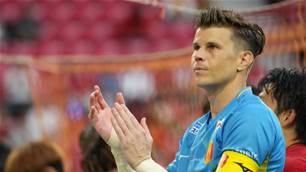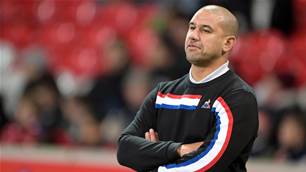There are few more idyllic locations in world football than Central Coast Stadium.
Gosfordians used to know where the Mariners’ stadium was. In 2007/08 Central Coast, under the stewardship of Lawrie McKinna, averaged over 15,000 people per match. Their Grand Final drew a 36,000-strong against Newcastle Jets.
Flash forward and this season is the Mariners’ worst on record. Just 6,000 trundle through the gates at Gosford, while this season’s highest attendance is only half of 2007’s average. Central Coast crowds are no longer joyously apathetic, they’re turning away in droves. Many are irate, but the worst are mocking.
The fans who thought it couldn’t get any worse than the guidance of Tony Walmsley sat through 20 losses in 24 matches this season. This ratio surpasses New Zealand Knights - a club that lasted two seasons before it folded - for the worst losing record in A-League history.
Mike Mulvey, a coach whose previous A-League tenure resulted in a Premiership/Championship double, won just five percent of his matches with the club.
"It's actually quite embarrassing as coaches and players to walk around Gosford and Terrigal because we want to be able to give the fans something to cheer about," Mulvey said a month before his sacking.
The English coach faced a titanic task at Central Coast. Gushing beneath pervasive rumours of backroom bust-ups and player desertions, a slew of simple undercurrents prevented the Mariners from winning matches.
While Mulvey replaced Paul Okon in April 2018, he suffered a pre-season devilled by the arrival of Usain Bolt, a publicity ploy which backfired immensely.
“We never rule out a marquee,” Mielekamp said a few months before Bolt’s arrival.
“We proved with Luis Garcia that it’s not an impossibility, it’s about the right person at the right time and what’s financially realistic. Some of the figures you hear out there at the moment…,” he laughed, “some of these things are impossible.”
“There is a marquee fund and if the right person comes along, we’ll make the right decision for our community.”
That ‘right person’ for a moment appeared to be the Jamaican sprinter. He came in swaggering with bravado and became a fixture on the nightly news. He conquered the Australian media in Mariners colours for a day, but then left unceremoniously, refusing to accept a contract offer from a club that he was never good enough to play for in the beginning.
Bolt briefly salvaged broader community interest in the Mariners, but ultimately left behind a hollow feeling and the stench of desperation. It was a patterned shift from a club that on the back of their own youth development had previously dominated the A-League.
In the shadow of the $100 million Tuggerah Centre of Excellence, the Mariners sold out, and in the process, lost a part of their identity.

Central Coast tragic and author of ‘Lawrie McKinna’s Dangerous Truth’, Adrian Deans, says Bolt’s trial represents a shift in the Mariners’ hierarchy’s approach.
“The team is playing badly which is a major turn off for many, but there is no great communicator like McKinna to go on giving hope and showing the road ahead,” Deans says.
“Instead we get silence from the likes of Mike Charlesworth and Mielekamp, or pathetic stunts like the Bolt farce which completely distracted from our pre-season.
“Mulvey must have been fuming as that unfolded, just as he fumed as his underfunded and misfiring team limp to second place every week.
“There is just no mental toughness when the hard work needs to be done in the second half. The mentality of the halves is very different – the run out and the run home – and it’s the run home that really matters when your quality has put you one or two up at half time.
“It’s that lack of resilience that most shows up in a lack of cohesion between the lines, bad decision making and unforced errors. The number of times I’ve seen the Mariners turn away from the easy ball or best option, hit the ball out under no pressure, or generally play without a plan does my head in.
“And as soon as they concede they expect to lose, and play accordingly.”
The A-League’s salary cap is supposed to provide a form of social security, existing so the Mariners, more than any other club, aren’t left in the gutter. But there’s no insurance policy on what Deans’ terms “something rotten” seeping into the Mariners’ culture.
Star imports Ross McCormack, Kalifa Cisse and Tom Hiariej seemingly copped out this season through poor-form and persistent injury, while the likes of Andrew Hoole were caught out defying drinking bans.
The once so promising youth conveyor belt grinded to a halt as $500,000 per-year Daniel De Silva was loaned out after failing to deliver. Then there was the loss of Antony Golec – who Mulvey had claimed he wanted “to build a team around”. Golec said after his departure that he “wasn’t happy” at the club and that the Bolt saga “looks bad because of what the club has been through”.
Most devastating is the departure of Matt Millar, for free, to the Mariners’ F3 rivals. Millar’s departure, while likely symptomatic of the Central Coast’s slow grinding mechanics taking took far too long to muster a contract offer, is also a sign of the times.
Given the faint sight of dry land, Mariners will jump ship.
Related Articles
.jpeg&h=172&w=306&c=1&s=1)
Socceroos prodigy returns to A-League after horror run

Star keeper's exit heralds hero's return at A-League giant













